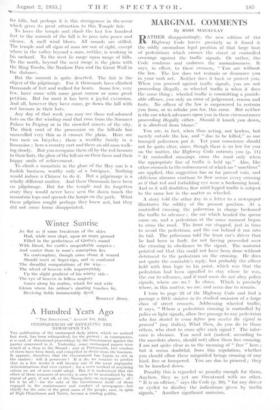MARGINAL COMMENTS
By ROSE MACAULAY
RATHER disappointingly, the new edition of the Highway Code leaves precisely as it found it the oddly anomalous legal position of that large host of pedestrians. which crosses the street at controlled crossings against . the traffic signals. Or rather,, the Code confirms and endorses. the anomalousness. It • says, in effect, to these crossers, 4.4 You are without the law. The law does not restrain or denounce you in your rash act.. Neither does it back or protect you. When you proceed against traffic signals, you arc not proceeding illegally, as wheeled traffic is when it does the same. thing ; wheeled, traffic is committing a punish- able offence, you only an error of judgement, reason and taste. No officer of the law is empowered to restrain. you from, or to, rebuke you for, this error. But neither is the car which advances upon you in these circumstances proceeding illegally either. Should it knock you down,- it is absolved from blame."
You are, in fact, when thus acting, not lawless, but merely outside the law, and " due to be killed," as our tranquil policemen put it. Yet your conscience should not be quite clear, since, though there is no law for you on the matter, the Highway Code entreats you (p. II) " At controlled crossings, cross the road only when the appropriate line of traffic is held up." Alas, like other counsels to the enforcement of which no " sanctions" are applied, this suggestion has so far proved vain, and oblivious streams continue to flow across every crossing as if that red and forbidding eye were a beckoning hand.. And so it will doubtless flow until legged traffic is subject to the same law in the matter as wheeled.
A story told the other day in a letter to a newspaper illustrates the oddity of the present position. At a controlled crossing, the policeman in charge beckoned the traffic to advance ; the car which headed the queue came on, and a pedestrian at the same moment began to cross the road. The front ear .stopped, just in time to avoid the pedestrian, and the car behind it ran into its tail. The policeman told the front car's driver that he had' been in fault, for not having proceeded over the crossing, in obedience to the signal. The motorist pointed out that this could not • have been done. without detriment to the pedestrian on the crossing. .He does not quote the constable's reply, but probably the- officer held with firm logic' to his point, which was that the pedestrian had been signalled to . stay where he was, the car to ,advance, and if road users do not obey police signals, where are we ? In chaos. Which is precisely where, in this matter, we are, and seem due to remain.
turn to page .23 of the Highway Code and find a pasSage a little sinister in its studied omission of n large class of street crossers. Addressing wheeled' traffic; it sayS, " Where a pedestrian crossing is , controlled' by police or light signals, allow free passage to any pedestrian.
who has started to cross before 'you receive the Signal' to proceed" (my italics). What then, do you do to those others, who start to cross after such signal ? The infer; once . is obvious. You need not (indeed, according : to the anecdote above, should not) allow' them free crossing; I am not quite clear as to the meaning of " free " here ; 'but it seems • doubtful, from this regulation, whether you: should allow these misguided beings crossing' of any kind, free or hampered. You are due to proceed ; they to be knocked down, Possibly this is regarded as penalty enough for them. • Anyhow, they as yet are threatened With no other. . . " It is an offence," says the Code (P. 20), "for any driver or cyclist to disobey the indications given by traffic signals." Another significant omission.






































 Previous page
Previous page